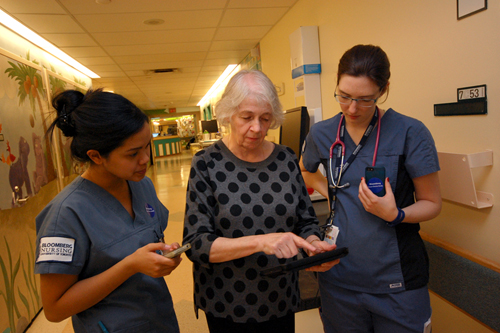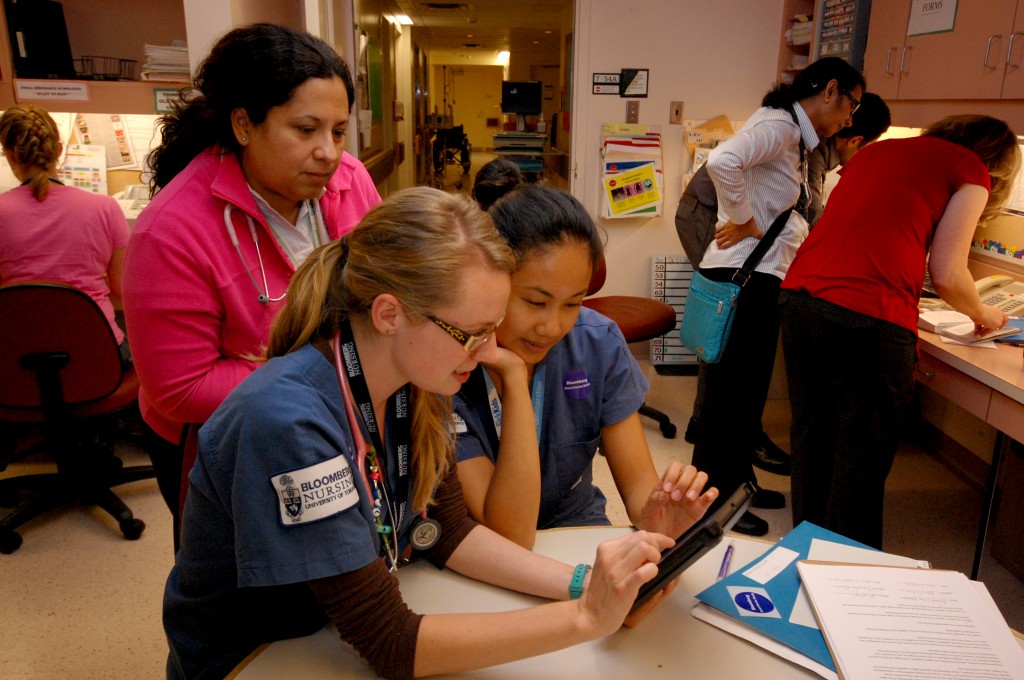(l to r: Clinical Instructor Elba Andrade, student Leah Orvis and student Monika Dalmacio)
Undergraduate nursing students give their bedside manner a technological boost through a Bloomberg Nursing pilot study on Smart Device Use Across the Curriculum: From Classroom to Clinical Practice Point-of-Care. Funded by the Provost’s Instructional Technology Innovation Fund (ITIF) and the Lawrence Bloomberg Faculty of Nursing, this study follows a group of second-year students as they navigate the classroom, the simulation lab and their clinical placements aided by a smartphone, iPod touch or iPad mini. Results of the study are still months away but recently at The Hospital for Sick Children (SickKids) the nursing students undertaking a clinical placement and also participating in the study have already seen how information at their fingertips impacts patient care.
“The future of health care involves integrating user-friendly and family-centred technology, and I think this project showcases how instrumental smart devices can be for care and education,” says Meghan Carroll, who is completing a placement at SickKids. “Having the ability to use a tablet at the bedside and, for example, show a parent a 3-D model of the human body and use it to explain their child’s condition and the recommended treatment would reduce the uncertainty many families feel during such a stressful and vulnerable time in their lives.”
Increasingly, patients are going to their own smart devices to educate themselves about their illnesses. Nurses now face patients who already feel well-informed and are often placed in situations where they need to provide patients with accurate, up-to-date information from reputable sources immediately. Equipping nurses with the evidence-based tools to address patient needs right away is necessary, but equally important is how to integrate that technology effectively at the point-of-care.
“Smart devices are traditionally not permitted for nursing students in clinical areas or even when they’re doing simulations but this study challenges that,” says Maureen Barry, principal investigator on the study and a senior lecturer at the Faculty of Nursing. “Observing the students as they use their mobile devices as information-gathering tools and how well the patients and their families are responding shows me, at these early stages, that these types of devices are invaluable to support evidence-informed nursing care.”
![]()
![]()

(l to r: Christine Paredes, Maureen Barry and Samantha Lander discuss their preferences for smart device applications)
The project, taking place at the Lawrence Bloomberg Faculty of Nursing and throughout clinical placements at Mount Sinai Hospital, Sunnybrook Health Sciences Centre and The Hospital for Sick Children, provides students with the opportunity to use their own device or borrow one from the Faculty for the duration of the study. Loaded with relevant nursing software programs, and armed with a fifty dollar gift card so students can download additional health care resources or applications (apps), the smart devices become a personalized device, which adds to the ease of accessing timely information.
“Having the information right in your hand makes it so much faster to look up medications and make calculations,” says Kaitlyn Smiley during her clinical placement at SickKids. “I’ve been able arrange the apps I’ll need to research multiple sources of information to my specifications, and to have the tools all in one place allows me to spend more time with the patient instead of tracking down information.”
Students also have access to the knowledge and input from the Gerstein Science Information Centre, part of the top three highest-ranked college and university library systems in North America. Ana Patricia Ayala, the nursing liaison librarian, provides additional resources to help nursing students leverage technological tools to enhance their research skills.
“It’s a privilege to foster one of the key missions of the University of Toronto Libraries’ by supporting innovations in technology and its application in learning and at the point of care,” says Ayala, also one of the co-investigators for the study. “The library supports research and patient care via relationships with the Health Science Information Consortium of Toronto and the Toronto Academic Health Science Network, and the findings of this study will better inform the instruction I provide to students, not only in the Nursing program, but across the health disciplines.”
Results from the study will be disseminated at various presentations and conferences on teaching scholarship beginning in 2014. From the initial student response, the smart devices are becoming an essential part of their ability to research, answer patient questions and deliver the most effective patient care.
“I’ve found my smartphone to be really useful in showing parents images of certain instruments or procedures to help them make an informed decision,” says Lindsay Delisle, also completing a clinical placement at SickKids. “At a lot of placements, nurses, doctors and students all need to access a limited number of computers so I’ve found using my smartphone has allowed me to do my research and have that capacity to be prepared without having to rely on a desktop computer.”
